- Home
- Piers Anthony
The Sopaths
The Sopaths Read online
THE SOPATHS
ALSO BY PIERS ANTHONY
SERIES
Of Man and Manta (3 books)
Xanth (36 books)
Adept (7 books)
Incarnations of Immortality (8 books)
Bio of a Space Tyrant (6 books)
Mode (4 books)
Geodyssey (5 books)
Chromagic (5 books)
SELECT OTHER BOOKS
Caterpillar’s Question (w/Philip José Farmer)
Pornucopia
The Magic Fart
Alien Plot
Prostho Plus
Race Against Time
Rings of Ice Avon
Triple Detente
Shade of the Tree
Ghost
Bio of an Ogre
Total Recall
Firefly
MerCycle
Killobyte
Tortoise Reform
THE
SOPATHS
PIERS ANTHONY
Premier Digital Publishing - Los Angeles
eISBN: 978-1-937957-33-9
Copyright © 2011 by Piers Anthony
Cover art Copyright © 2011 by Dan Henk
All rights reserved. No part of this book may be reproduced or transmitted in any form or by any means, electronic or mechanical, including photocopying, recording, or by any information storage and retrieval system, without the written consent of the publisher, except where permitted by law.
Premier Digital Publishing
www.PremierDigitalPublishing.com
Follow us on Twitter @PDigitalPub
Follow us on Facebook: Premier Digital Publishing
FOREWORD
There has been a good deal of controversy about the so-called Fungo revolution and its founder, Abner Slate. He was accused of murdering children and fostering a sinful society. But it must also be recognized that he saved the world from the dread menace of the sopaths. Was he a hero or a criminal? Much has been written about him and the inconclusive legal cases against him, but little about his personal life, because he did his best to keep it private and out of the news. His immediate family supported him completely, and so did what became a huge personal global following that treated him almost as a religious figure. He could have become fabulously wealthy had he chosen such a course, but his integrity prevented that.
This is the inside story of that private life, based on personal interviews with Mr. Slate and those closest to him, as well as the records of Pariah, the secretive society he worked with. This will perhaps clarify some of the more alarming suspicions. Abner Slate was very much a person of his time, and it was an awful time. He did what needed to be done when it was necessary. Perhaps no more than that needs to be said of his place in history.
CHAPTER 1
Abner paused to survey the site: it was a nice suburban house surrounded by a park-like landscape. The sign said GRANVILLE VILLAGE NURSERY SCHOOL – “IT TAKES A VILLAGE.” The clamor of happy children could be heard from inside.
He knocked on the door. A middle aged woman opened it. “Mr. Slate?” she inquired.
“Yes. I just wanted to inquire–”
“Of course. I am Mrs. Johnson. Please do come in.”
He followed her into a small private office and took the indicated chair. “If you don’t have room for another child–”
“I regret to say it isn’t that, Mr. Slate. I believe in candor, and there is something I think you should know, though my colleagues advise against this.” She paused significantly.
“Something about Olive,” he said. He knew he was not going to like this. “I realize she is a headstrong child. That’s why we felt that the experience of a good, disciplined nursery school would be appropriate.”
“Ordinarily, yes. But Mr. Slate, this–this may be something else. Of course we can’t be certain, nobody can be absolutely certain in a case like this, but there is strong suspicion. We simply can’t afford to take the chance.”
Abner tried to make his stomach muscles relax. “Take what chance?”
“The chance of the disruption her presence could cause. The–the danger.”
“What danger?”
She visibly steeled herself. “Mr. Slate, we suspect she might be a sopath.”
This caught him by surprise. “A what?”
Her mouth formed a grim smile. “You are not familiar with that term, of course.” She paused again.
Abner resisted the urge to point out that his question had already adequately indicated that. “Yes.”
“Now understand, we could be mistaken. It really is almost impossible to be sure. Still, considering the welfare of the other children, we must err on the side of caution.”
“What is a sopath?”
“And naturally it has nothing to do with the merit of the parents. It is essentially random. So I mean absolutely no offense to you.”
This was definitely what he had feared: that there was something fundamentally wrong with his child. “What is a sopath?” he repeated grimly.
“Please be patient with me, Mr. Slate. This is an extremely uncomfortable matter.”
He gazed at her intently.
“I need to provide some background,” she said after a moment. “Mr. Slate, are you a religious man?”
“What has that to do with this?”
“We are nondenominational, of course. But there is one aspect that relates regardless. Religious folk tend to grasp it more rapidly.”
He was annoyed, but bore with it. “We attend the local Protestant church every Sunday, and support it financially. Is that answer sufficient?” He was actually a doubter, stemming from his military experience. He had seen and experienced things that no God worthy of the name would have tolerated. But that was none of her business.
“Do you believe in souls?”
This caught him entirely off-guard. “Souls?”
“More specifically, in reincarnation?”
“Reincarnation! That’s not Christian.”
She would not be swayed. “Do you?”
“Maybe,” he agreed reluctantly. “But I did not come here to discuss theology.”
“This is beyond theology, Mr. Slate. This is a drastically secular matter at this point. But it will help if you do believe in the immortality of souls.”
What could she possibly be getting at? She did not seem to be proselytizing. “Assume that I do.”
“The soul normally enters a baby at birth, and remains with that person throughout life, departing only when that person dies. Then it becomes available for a new baby. Souls are immortal, as human beings are not.”
“If you are trying to push a religious point, Mrs. Johnson, I will make a formal protest.”
“I am not, Mr. Slate.”
“There is a secular point to this?”
“Very much, Mr. Slate. It seems that souls do exist, and that the number of human souls is limited to something above six billion. Perhaps that is the limit beyond which the original generic soul can no longer be divided. Unfortunately our population has recently expanded beyond that limit. Do you understand what that means?”
“How do the extra babies acquire souls, then?”
“That is precisely the question, Mr. Slate. Some babies are born without souls, because the souls have run out. Only a minority, at present, because the deaths of souled people constantly return souls to circulation, as it were. But the number of vacancies is increasing, as the population continues to grow. The–the ratio is changing. Perhaps five years ago only one baby in ten thousand lacked a soul; now we suspect it is more like one in a hundred.”
Abner dreaded her point. “And you think Olive is one of these soulless ones?”
“This is what we fear, Mr. Slate. We call them sopaths. That is a cont
raction of sociopaths–-children without conscience. Because you see, we now know that the soul is the source of conscience.”
“But isn’t conscience learned?”
“Yes. But the capacity for it must exist. A sopath lacks that capacity. A sopath will never develop a conscience. Will never feel remorse. Never love selflessly. The only thing that moves a sopath is the prospect of immediate personal gain, and the only thing that daunts a sopath child is the threat of immediate pain or death. They are literally ungovernable, short of ugly measures. Now can you appreciate why we don’t want to take your little girl?”
“Damn!” It made too much sense. He had hoped that Olive was merely wild, but she did fit the pattern this woman was describing.
“Of course we’re not certain, Mr. Slate. I hope we are mistaken. But we feel we must not take the risk. Do you understand?”
“Yes,” he said tightly. “How did you identify her, after only a brief interview?”
“We have had experience. One sopath is more than enough to alert a person. But I repeat, we are not sure of your child. All children are selfish; it takes time to distinguish natural childishness from incorrigibility. But it’s a calculated risk that we feel we can’t afford.”
The woman was after all being practical. “I fear you are right. Assuming Olive is a–a sopath–what can we do about it? How should we handle the situation?”
“Mr. Slate, it is not my place to advise you on such a thing.”
“What should we do?” he repeated firmly.
“I can give only an opinion, which may be erroneous or inapplicable to your case.”
He was tired of evasions. “What?”
“Mr. Slate, there is only one treatment we know, and only one cure. The treatment is permanent incarceration, in the manner of a rabid animal. You must cage her.”
“We can’t do that. What’s the cure?”
The woman winced as she spoke. “Death.”
“You’re telling us to kill our baby.”
Mrs. Johnson backed off immediately. “I shouldn’t have said that. I apologize.”
He shook his head. “You said what you meant.”
“I didn’t want to say it. Surely I am wrong. How can anyone destroy a little child?”
How, indeed! Yet he had done it while serving overseas. He had been a sergeant, trying to protect his complement from surprise attack. They had pursued a suspected young sniper, who had fled into a house and not emerged. They had a mission to accomplish, and could not afford to be ambushed on their return. They had to take out the sniper, and could not take time to lay siege to the premises. “Burn the house,” he had ordered tersely. They had done so, then discovered it was an orphanage. Several children were burned to death. The suspected sniper was merely an older child spying on the foreign troops. The horror of it had haunted him for months.
Abner stood. “Thank you for your candor, Mrs. Johnson. I think we do have a problem.”
She stood too. “I fear I said too much. It is not my business to diagnose any such condition.”
He saw what was bothering her. “I will consider this interview to be private. I thank you for your information, uncomfortable as it is.”
“And of course I’m not recommending that you––”
She could get in trouble with the law for suggesting that a child be killed. “Of course. I will seek other information.”
She nodded. “That would be appreciated.”
Abner drove home, deep in thought. He hated the notion, but knew that the woman had spoken truth. Olive was incorrigible. He had not wanted to believe it, but too much was falling into place. The nursery school woman had not offered a revelation so much as confirmation. Now he had a name for it: sopath. One who was sociopathic. Not crazy, merely without conscience. There were others like her. And a rationale: she lacked a soul. It was not the fault of her upbringing, but of the accident of timing. She had arrived when no soul was available, missing her window of opportunity. Apparently souls did not offer twice. Maybe it occurred at the moment of birth, and thereafter the avenue into the baby was closed off. A practical rather than a religious thing.
Zelda met him at the door, wearing a bathrobe. She looked the question. He shook his head.
“Damn!” she said, echoing his own reaction. “I know it seems unloving, but I wanted to have her out of the house for a few hours at a time, so I could relax.”
“Where is she now?”
“Asleep. She does get tired after rampaging, fortunately. It’s a small blessing.”
“Jasper?”
“Playing a video. He’ll be entranced for at least an hour.”
“You knew we’d have to talk.”
She nodded. “It has been too pervasive, too rough. I feared what you would learn.”
“With justice. Have you heard the word ‘sopath’ before?”
“Yes,” she said grimly. “That’s what I feared. I overheard two women talking at the store. Incorrigible?”
“If she is one. They’re not sure.”
“She is one. Is there any treatment?”
“They–they said she had to be caged–-or killed. That once a sopath is born, there’s no further chance for a soul, and therefore there can be no conscience. It will just get worse.”
Her eyes were fixed. “Abner, before we–we continue this discussion—can we take a break?”
“A break?”
She let her robe fall open, showing her bare breasts.
Surprised, Abner did a quick assessment. Zelda, unlike most women, grew passionate when stressed. It was her way of diverting the bad feeling. This was bad news, but he could not demur.
In moments they were at it, making desperate love. Zelda was a well-formed woman, always a pleasure to see and touch. But he wished there could have been some other occasion for this delight.
As they concluded, there was a sound. Both of them paused, but it seemed to be nothing, so they relaxed.
“You were saying?” she inquired as she cleaned up. Her mood had definitely improved.
“They have had experience. They won’t take a sopath. The term is a contraction of sociopath, and it means a hopeless case. They say it’s not our fault; she just happened to be born when there wasn’t a soul available.”
“Caged or killed,” she repeated as she dressed. “Abner, I can’t do either of those things. She’s our child.”
“I know.” He spread his hands. “We’ll just have to watch her. Closely.”
“But how can I get a job if I can’t leave her alone?”
“Maybe there’s a facility for them. A place where they know how to handle them.”
“Like a prison?” she asked sharply.
“Like a reform school.”
“She’s only three years old!”
And that was only part of the problem. “We’ll think of something,” he said with obviously false hope.
She opened the door, stepped into the hall, and screamed.
Abner leaped to join her. There was blood spreading from Jasper’s room. “I’ll handle it,” he said, steering her back into the bedroom. She went without protest.
He looked into Jasper’s room. The boy was sprawled across his bed, bathed in blood. A pool of it was jelling on the floor, extending to the doorway. The boy’s throat had been slit.
Abner leaped to the small figure. The blood was still spilling out. He caught a fold of the sheet in his hand and clapped it to Jasper’s throat. He felt a faint pulse. Had he stopped it in time?
“Zelda!” he called. “Call an ambulance! He’s alive but fading.” Then he held on, holding the boy’s remaining blood inside while waiting.
Zelda got on the phone, and soon the ambulance arrived. Abner got out of the way and let Zelda handle it. She was competent, now that there was something positive to do. If the boy had been dead, it would have been another matter.
Numb, Abner walked to Olive’s room. She was just finishing a candy bar. There was a spot of blood on her nigh
tie.
He kept his voice level. “Where did you get that bar, Olive?”
“From Jasper,” she answered matter-of-factly, licking her fingers.
“Did he give it to you?”
“No.”
“How did you get it from him?”
“I snucked behind him and cut his throat and took it.”
“Olive, you shouldn’t do that.”
She continued licking her fingers, ignoring him. And of course it was a stupid thing to say. The word “should” had no meaning for her, only “can.” Jasper had had something she wanted, and wouldn’t give it to her, so she had taken it. By almost killing him.
He closed the door and walked back to the bedroom. Zelda was standing where he had left her, facing away as the medic continued to stabilize the boy. “That sound,” she said.
What could he tell her? “Maybe you better lie down. I’ll call the police.”
“They have already done that. I’ll go to the hospital with Jasper. I just want to know.”
There was no way out. “She tried to kill him.”
She nodded. “Why?”
“She wanted his candy bar.”
She shuddered. “Tell them it was an accident.”
Because even after this she couldn’t stand to do what they had to do. He knew better, but couldn’t have her freaking out right now. “Okay.”
They took Jasper away, and Zelda went with them.
Abner waited. If they had gotten over there when they heard the sound, would they have been in time? He suspected not. The child had “snucked” up behind her older brother with the knife while he was preoccupied with the video game, and sliced his throat. Had she even asked for the candy bar? Probably not, as she knew he wouldn’t share. The sound might have been him collapsing on the bed, or her departing the room with the candy bar.
They should have locked her in her room until they could watch her. They had been caught short by that lapse.
The police surveyed the scene. They found the knife where it lay under a sheet. It would have Olive’s fingerprints on it. “They were playing,” Abner said. “We didn’t realize the knife was real. It was a horrible accident.”

 Serial
Serial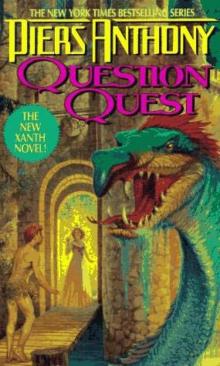 Question Quest
Question Quest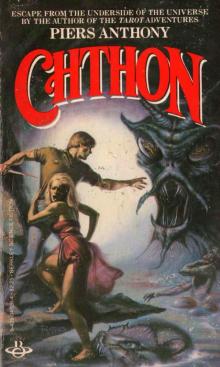 Chthon
Chthon Dragon on a Pedestal
Dragon on a Pedestal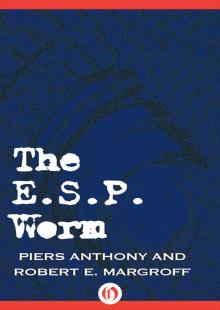 E. S. P. Worm
E. S. P. Worm Hope of Earth
Hope of Earth The Series Boxed Set
The Series Boxed Set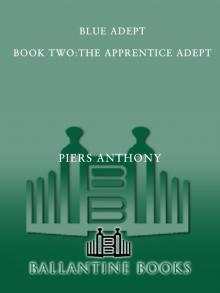 Blue Adept
Blue Adept The Sopaths
The Sopaths Beetle Juice
Beetle Juice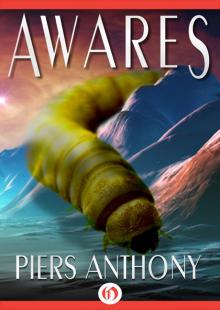 Awares
Awares Golem in the Gears
Golem in the Gears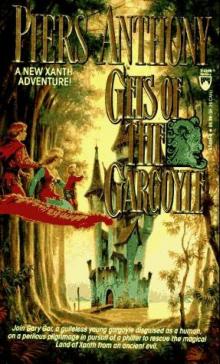 Geis of the Gargoyle
Geis of the Gargoyle Bamboo Bloodbath and Ninja's Revenge
Bamboo Bloodbath and Ninja's Revenge Heaven Cent
Heaven Cent Neq the Sword
Neq the Sword Pandora Park
Pandora Park Juxtaposition
Juxtaposition Bearing an Hourglass
Bearing an Hourglass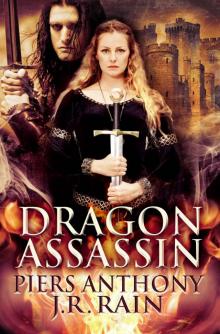 Dragon Assassin
Dragon Assassin Board Stiff
Board Stiff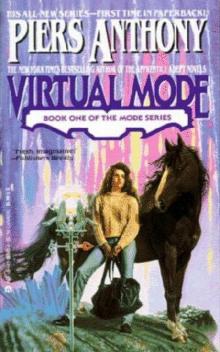 Virtual Mode
Virtual Mode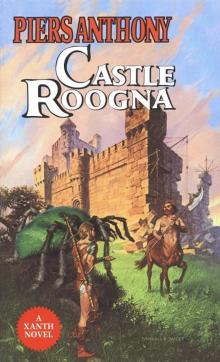 Castle Roogna
Castle Roogna Aliena Too
Aliena Too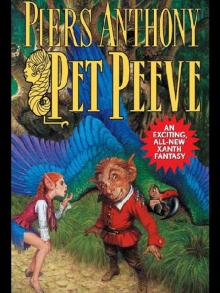 Pet Peeve
Pet Peeve The Metal Maiden Collection
The Metal Maiden Collection Volk
Volk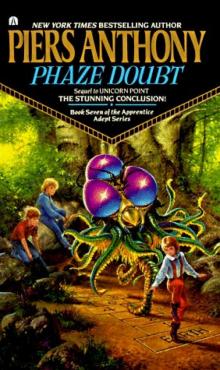 Phaze Doubt
Phaze Doubt The Color of Her Panties
The Color of Her Panties Amazon Slaughter and Curse of the Ninja Piers Anthony
Amazon Slaughter and Curse of the Ninja Piers Anthony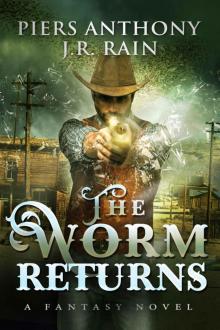 The Worm Returns
The Worm Returns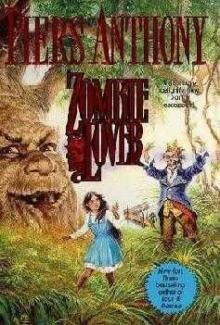 Zombie Lover
Zombie Lover Xone of Contention
Xone of Contention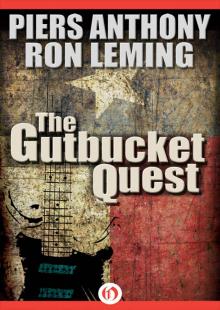 The Gutbucket Quest
The Gutbucket Quest Split Infinity
Split Infinity Dream a Little Dream: A Tale of Myth and Moonshine
Dream a Little Dream: A Tale of Myth and Moonshine Balook
Balook Out of Phaze
Out of Phaze The Secret of Spring
The Secret of Spring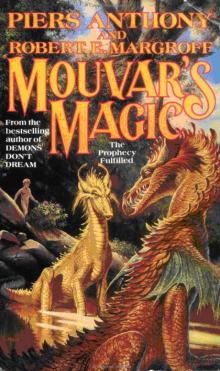 Mouvar's Magic
Mouvar's Magic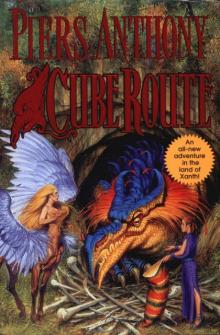 Cube Route
Cube Route Mercenary
Mercenary Total Recall
Total Recall Man From Mundania
Man From Mundania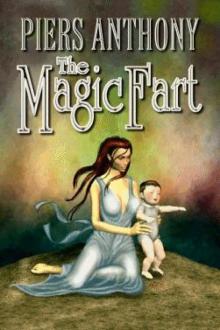 The Magic Fart
The Magic Fart Letters to Jenny
Letters to Jenny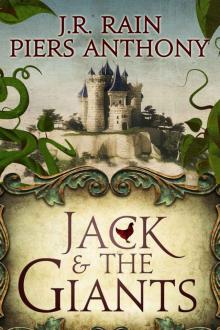 Jack and the Giants
Jack and the Giants Executive
Executive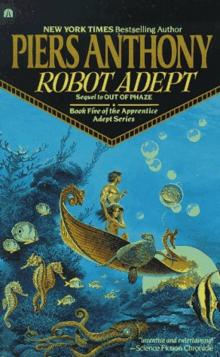 Robot Adept
Robot Adept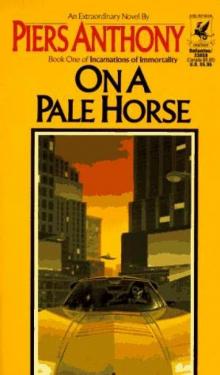 On A Pale Horse
On A Pale Horse Vale of the Vole
Vale of the Vole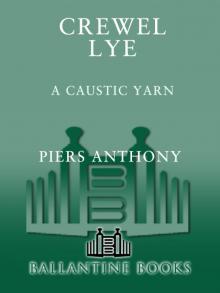 Crewel Lye
Crewel Lye For Love of Evil
For Love of Evil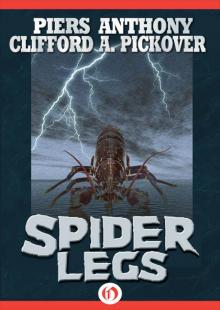 Spider Legs
Spider Legs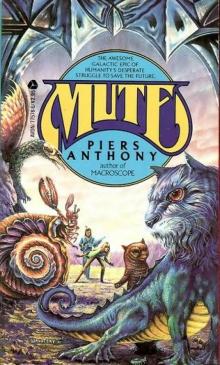 Mute
Mute Being a Green Mother
Being a Green Mother Hair Suite
Hair Suite Air Apparent
Air Apparent Politician
Politician Aliena
Aliena Phthor
Phthor Ghost Writer in the Sky
Ghost Writer in the Sky Pornucopia
Pornucopia Eroma
Eroma Shepherd
Shepherd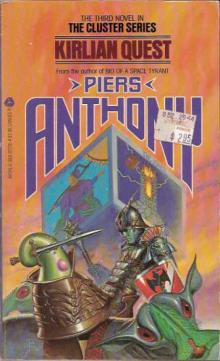 Kirlian Quest
Kirlian Quest Swell Foop
Swell Foop God of Tarot
God of Tarot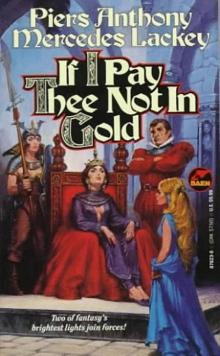 If I Pay Thee Not in Gold
If I Pay Thee Not in Gold Amazon Expedient
Amazon Expedient Faun & Games
Faun & Games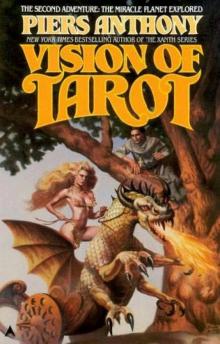 Vision of Tarot
Vision of Tarot Centaur Aisle
Centaur Aisle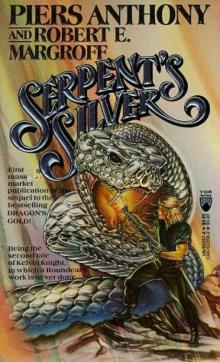 Serpent's Silver
Serpent's Silver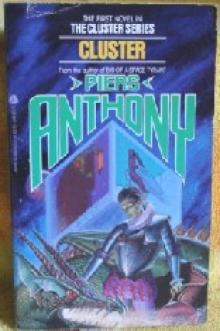 Cluster
Cluster With a Tangled Skein
With a Tangled Skein Chaining the Lady
Chaining the Lady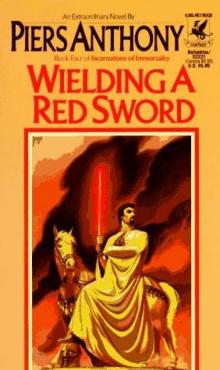 Wielding a Red Sword
Wielding a Red Sword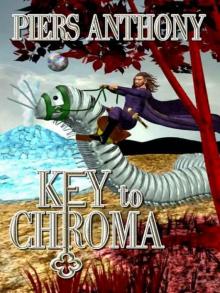 Key to Chroma
Key to Chroma WereWoman
WereWoman Isis Orb
Isis Orb Hair Peace
Hair Peace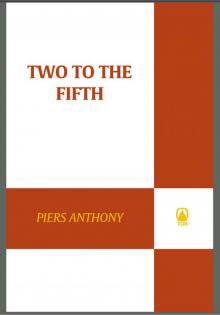 Two to the Fifth
Two to the Fifth Viscous Circle
Viscous Circle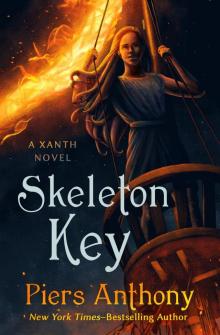 Skeleton Key
Skeleton Key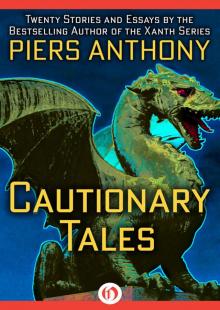 Cautionary Tales
Cautionary Tales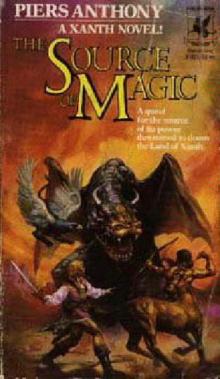 The Source of Magic
The Source of Magic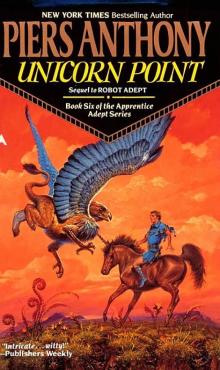 Unicorn Point
Unicorn Point Writer's Retweet
Writer's Retweet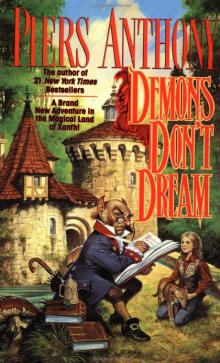 Demons Don't Dream
Demons Don't Dream Ogre, Ogre
Ogre, Ogre The Iron Maiden
The Iron Maiden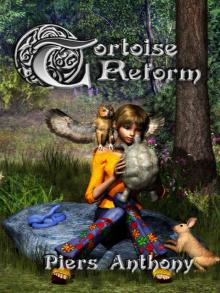 Tortoise Reform
Tortoise Reform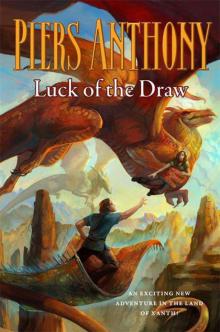 Luck of the Draw
Luck of the Draw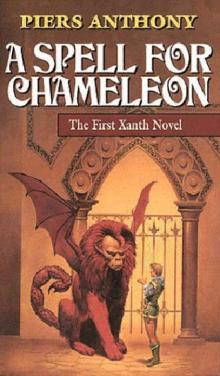 A Spell for Chameleon
A Spell for Chameleon Yon Ill Wind
Yon Ill Wind Currant Events
Currant Events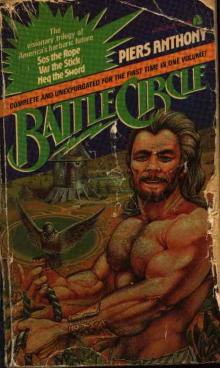 Var the Stick
Var the Stick And Eternity
And Eternity Kiai! & Mistress of Death
Kiai! & Mistress of Death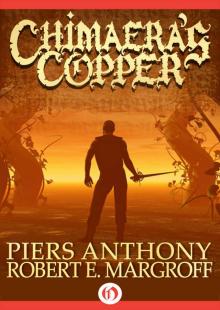 Chimaera's Copper
Chimaera's Copper Refugee
Refugee Isle of View
Isle of View Thousandstar
Thousandstar Mer-Cycle
Mer-Cycle Service Goat
Service Goat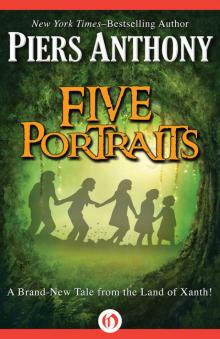 Five Portraits
Five Portraits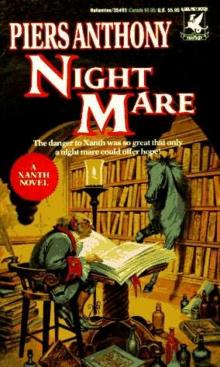 Night Mare
Night Mare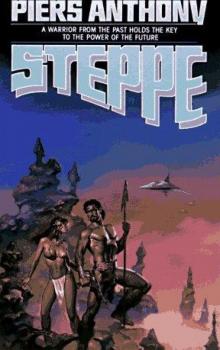 Steppe
Steppe Lavabull
Lavabull Well-Tempered Clavicle
Well-Tempered Clavicle Aladdin Relighted
Aladdin Relighted Aladdin and the Flying Dutchman
Aladdin and the Flying Dutchman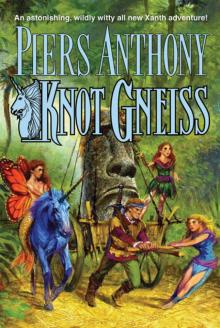 Knot Gneiss
Knot Gneiss Roc and a Hard Place
Roc and a Hard Place Aladdin Sins Bad
Aladdin Sins Bad Flytrap
Flytrap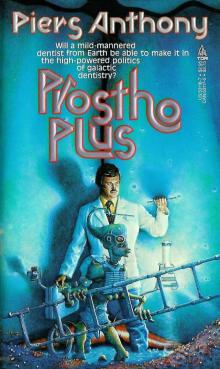 Prostho Plus
Prostho Plus Esrever Doom
Esrever Doom Hair Power
Hair Power The Journey
The Journey Virtue Inverted
Virtue Inverted Of Man and Manta Omnibus
Of Man and Manta Omnibus Trail Mix: Amoeba
Trail Mix: Amoeba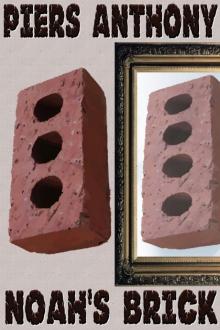 Noah's Brick
Noah's Brick Odd Exam
Odd Exam Magenta Salvation
Magenta Salvation Jest Right
Jest Right Fire Sail
Fire Sail Chthon a-1
Chthon a-1 Amoeba
Amoeba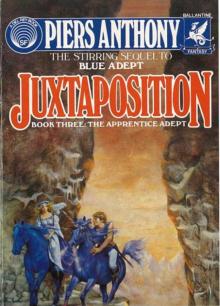 Juxtaposition aa-3
Juxtaposition aa-3 Pira
Pira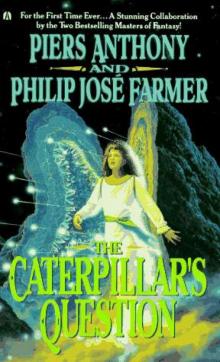 THE CATERPILLARS QUESTION
THE CATERPILLARS QUESTION What Fears Become: An Anthology from The Horror Zine
What Fears Become: An Anthology from The Horror Zine Bio of a Space Tyrant Vol. 3. Politician
Bio of a Space Tyrant Vol. 3. Politician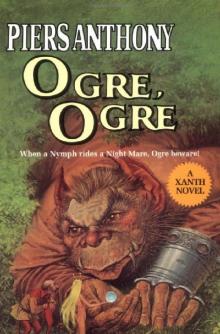 Ogre Ogre x-5
Ogre Ogre x-5 Rings of Ice
Rings of Ice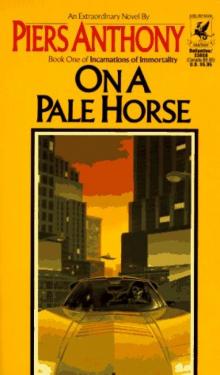 On a Pale Horse ioi-1
On a Pale Horse ioi-1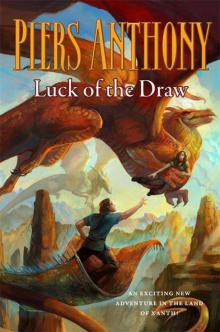 Luck of the Draw (Xanth)
Luck of the Draw (Xanth)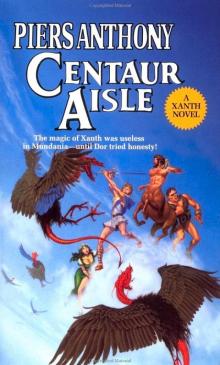 Centaur Aisle x-4
Centaur Aisle x-4 Thousandstar (#4 of the Cluster series)
Thousandstar (#4 of the Cluster series)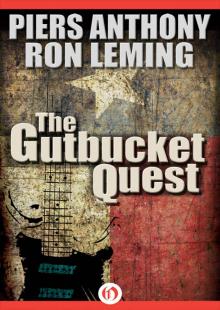 Gutbucket Quest
Gutbucket Quest Isle of Woman (Geodyssey)
Isle of Woman (Geodyssey)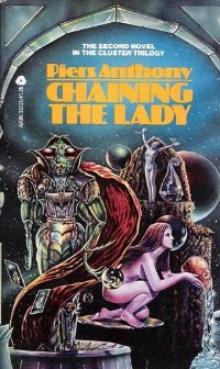 Chaining the Lady c-2
Chaining the Lady c-2 To Be a Woman
To Be a Woman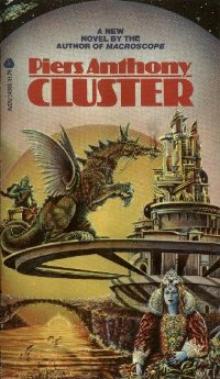 Cluster c-1
Cluster c-1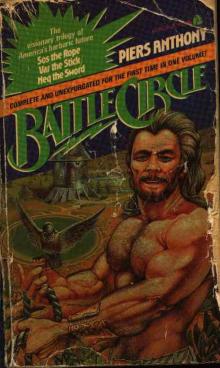 Battle Circle 2 - Var the Stick
Battle Circle 2 - Var the Stick Mercenary (Bio of a Space Tyrant Book 2)
Mercenary (Bio of a Space Tyrant Book 2)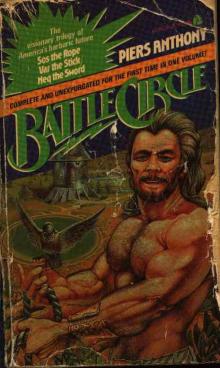 Battle Circle 1 - Sos the Rope
Battle Circle 1 - Sos the Rope Xanth 30 - Stork Naked
Xanth 30 - Stork Naked Secret of Spring
Secret of Spring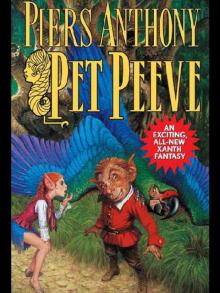 Xanth 29 - Pet Peeve
Xanth 29 - Pet Peeve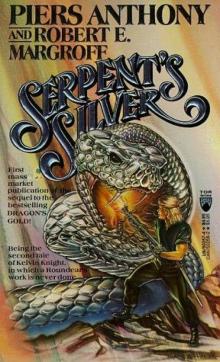 Serpents's Silver
Serpents's Silver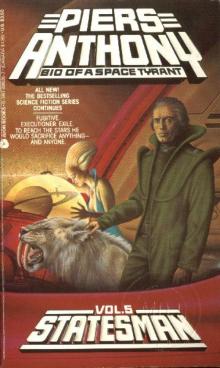 Statesman by Piers Anthony
Statesman by Piers Anthony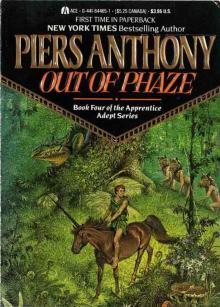 Out of Phaze aa-4
Out of Phaze aa-4 Amazon Slaughter & Curse of the Ninja
Amazon Slaughter & Curse of the Ninja